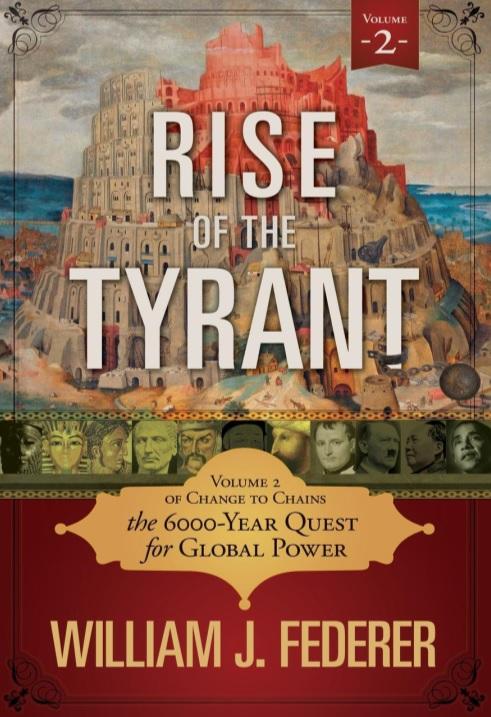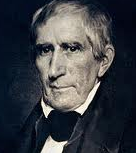American Minute with Bill Federer: “Tippecanoe and Tyler too” was the campaign slogan of 9th President William Henry Harrison, born FEBRUARY 9, 1773.

Harrison was an aide-de-camp to General “Mad Anthony” Wayne, who defeated the British and Indians at the Battle of Fallen Timbers, 1794.

Harrison was the hero of the Battle of Tippecanoe, 1811, and the Battle of the Thames, 1813, recovering Detroit from the British and their Indian allies led by Shawnee chief Tecumseh.

He was the son of Benjamin Harrison, signer the Declaration of Independence, and he was the grandfather of Benjamin Harrison, the 23rd President.
William Henry Harrison became Secretary of the Northwest Territory, consisting of 260,000 square miles from which were formed the States of Ohio, Indiana, Illinois, Michigan, Wisconsin and Minnesota.

He was the Territory’s first delegate to Congress and the Governor of the Indiana Territory in 1801.
William Henry Harrison served the shortest term as President, only 31 days, after having given the longest Inaugural address, consisting of 8,445 words.

Written with the help of Daniel Webster, it took nearly two hours to deliver in the cold, wet weather in Washington, D.C.
Contracting pneumonia, and with little time to recuperate due to the demands of the office, Harrison, on April 4, 1841, became the first President to die in office.

In his Inaugural Address, March 4, 1841, President William Henry Harrison gave serious warnings:
“The great danger to our institutions does … appear to me to be ... the accumulation in one of the departments of that which was assigned to others.

… Limited as are the powers which have been granted, still enough have been granted to constitute a despotism if concentrated in one of the departments … particularly … the Executive…
The tendency of power to increase itself, particularly when exercised by a single individual … would terminate in virtual monarchy …”

Harrison’s warnings were echoed by other Presidents. Ronald Reagan stated in his Inaugural Address, January 20, 1981:
“Government is not the solution to our problem …
We’ve been tempted to believe … that government by an elite group is superior to government for, by, and of the people …
We are a nation that has a government — not the other way around. And this makes us special among the nations of the Earth.
Our government has no power except that granted it by the people. It is time to check and reverse the growth of government, which shows signs of having grown beyond the consent of the governed …
Our present troubles … are proportionate to the intervention and intrusion in our lives that result from unnecessary and excessive growth of government.”

President Donald J. Trump stated in his Inaugural Address, January 20, 2017:
“Today we are not merely transferring power from one Administration to another, or from one party to another — but we are transferring power from Washington, D.C. and giving it back to you, THE AMERICAN PEOPLE …
For too long, a small group in our nation’s Capital has reaped the rewards of government while the people have borne the cost.
Washington flourished — but the people did not share in its wealth. Politicians prospered — but the jobs left, and the factories closed.
The establishment protected itself, but not the citizens … That all changes – starting right here, and right now …
The United States of America, is your country. What truly matters is not which party controls our government, but whether our government is controlled by THE PEOPLE.”

William Henry Harrison continued his Inaugural warning, March 4, 1841:
“Republics can commit no greater error than to … continue any feature in their … government which may … increase the love of power in the bosoms of those to whom necessity obliges them to commit the management of their affairs …
When this corrupting passion once takes possession of the human mind, like the love of gold it becomes insatiable. It is the never-dying worm in his bosom, grows with his growth and strengthens with the declining years of its victim.”

President Harry S Truman wrote in a personal memorandum, April 16, 1950:
“There is a lure in power. It can get into a man’s blood just as gambling and lust for money have been known to do.”
Henry Adams, the great-grandson of John Adams, stated:
“Power is poison.”

President Harrison continued:
“It is the part of wisdom for a republic to limit the service of that officer … to whom she has intrusted the management of her foreign relations, the execution of her laws, and the command of her armies and navies to a period so short as to prevent his forgetting that he is the accountable agent, not the principle; the servant, not the master …”
Rise of the Tyrant – Volume 2 of Change to Chains: The 6,000 Year Quest for Global Power

Harrison warned:
“The great dread … seems to have been that the reserved powers of the States would be absorbed by … the Federal Government and a consolidated power established, leaving to the States the shadow only of that independent action for which they had so zealously contended …
There is still an undercurrent at work by which, if not seasonably checked, the worst apprehensions of our anti-federal patriots will be realized …
Not only will the State authorities be overshadowed by the great increase of power in the Executive department … but the character of that Government, if not its designation, be essentially and radically changed.

… This state of things has been in part effected by ... the never-failing tendency of political power to increase itself.”

Reagan reflected his sentiment in his Inaugural:
“It is my intention to curb the size and influence of the Federal establishment and to demand recognition of the distinction between the powers granted to the Federal Government and those reserved to the States or to the people.
All of us need to be reminded that the Federal Government did not create the States; the States created the Federal Government.”

President Trump worded this view:
“January 20th 2017, will be remembered as the day THE PEOPLE became the rulers of this nation again.”

Harrison continued his warning if the President controlled the Treasury:

“It is not by the extent of its patronage alone that the Executive department has become dangerous, but by the use which it appears may be made of the appointing power to bring under its control the whole revenues of the country …
There was wanting no other addition to the powers of our Chief Magistrate to stamp monarchical character on our Government but the control of the public finances …

… The first Roman Emperor, in his attempt to seize the sacred treasure, silenced the opposition of the officer to whose charge it had been committed by a significant allusion to his sword …
I know the importance … to the divorce … the Treasury from the banking institutions…
It was certainly a great error in the framers of the Constitution not to have made … the head of the Treasury Department entirely independent of the Executive …
A decent and manly examination of the acts of the Government should be not only tolerated, but encouraged …”

Harrison warned there would be “class warfare”:
“As long as the love of power is a dominant passion of the human bosom, and as long as the understanding of men can be warped and their affections changed by operations upon their passions and prejudices, so long will the liberties of a people depend on their constant attention to its preservation.
The danger to all well-established free governments arises from the unwillingness of the people to believe in … the influence of designing men …
This is the old trick of those who would usurp the government of their country. In the name of democracy they speak, warning the people against the influence of wealth and the danger of aristocracy.

… History, ancient and modern, is full of such examples.
Caesar became the master of the Roman people and the senate under the pretense of supporting the democratic claims of the former against the aristocracy of the latter;

… Cromwell, in the character of the protector of the liberties of the people, became the dictator of England,

and Bolivar possessed himself of unlimited power with the title of his country’s liberator …
The tendencies of all such governments in their decline is to monarchy,
and the antagonist principle to liberty there is the spirit of faction — a spirit which assumes the character and in times of great excitement imposes itself upon the people as the genuine spirit of freedom,

and, like the false Christs whose coming was foretold by the Savior, seeks to, and were it possible would, impose upon the true and most faithful disciples of liberty.
It is in periods like this that it behooves the people to be most watchful of those to whom they have intrusted power …”

This is insight was stated by Senator Daniel Webster, May 27, 1834:
“The contest, for ages, has been to rescue liberty from the grasp of executive power.”

Woodrow Wilson addressed the New York Press Club, September 9, 1912:
“The history of liberty is a history of the limitation of governmental power, not the increase of it.”

Get the DVD CHANGE TO CHAINS: The 6,000 Year Quest for Global Control

President Harrison contrasted the “spirit of liberty” with the “spirit of party”:
“There is at times much difficulty in distinguishing the false from the true spirit, a calm investigation will detect the counterfeit …
The true spirit of liberty … is mild and tolerant and scrupulous …
whilst the spirit of party, assuming to be that of liberty, is harsh, vindictive, and intolerant, and totally reckless as to the character of the allies which it brings to the aid of its cause …

… The reign of an intolerant spirit of party amongst a free people seldom fails to result in a dangerous accession to the Executive power introduced and established amidst unusual professions of devotion to democracy.”

Harrison concluded his Inaugural Address by stating:
“I deem the present occasion sufficiently important and solemn to justify me in expressing to my fellow citizens a profound reverence for the Christian religion,
and a thorough conviction that sound morals, religious liberty, and a just sense of religious responsibility are essentially connected with all true and lasting happiness.
And to that good Being who has blessed us by the gifts of civil and religious freedom … let us unite in fervently commending every interest of our beloved country in all future time.”
